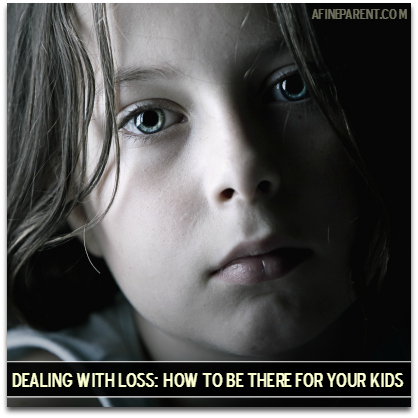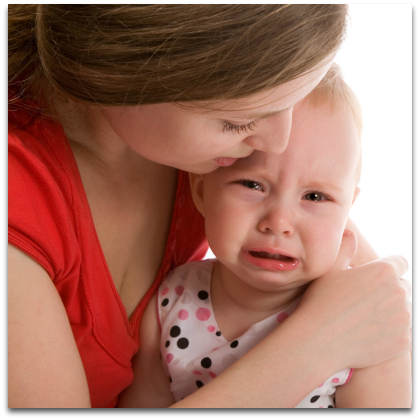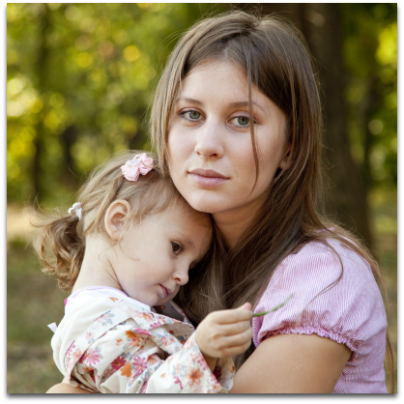 Have you ever lost something or someone you love? Do you remember the sinking sensation that dealing with loss brings?
Have you ever lost something or someone you love? Do you remember the sinking sensation that dealing with loss brings?
Horrible, isn’t it? For an instant the bottom falls out of your world. Depending on what or who you have lost, you may feel adrift for quite some time.
It is for our children as well. And in some ways, a whole lot worse.
Little people they may be, but loss brings with it some monumental emotions, even to them. It’s difficult enough to manage as an adult; can you imagine how hard it must be for kids?
What makes it worse is that, in their little, still-developing brains, they cannot quite see the difference between the loss of a favorite blankie, a pet, a best friend’s loyalty or their nana the previous year.
To them, they all feel equally monumental and overwhelming. And when the adults in their lives just don’t get it, this adds to the anxiety.
If you are reading this site, parenting positively though life’s little and big crises is probably one of your goals. Let’s take a look at what we can do to help our children through the maze of dealing with loss so they can grow into strong emotionally intelligent adults.
1: Connect, Don’t Coddle
 As parents our natural instinct is to shield our child from hurt. But when loss strikes, there is often little we can do to change things. Denying that the loss has happened or softening the blow with ambiguous words and explanations will only serve to confuse.
As parents our natural instinct is to shield our child from hurt. But when loss strikes, there is often little we can do to change things. Denying that the loss has happened or softening the blow with ambiguous words and explanations will only serve to confuse.
What we can do is connect with our kids.
I love this quote from child psychologist Alan Wolfelt – it helps me to keep my kids’ feelings in perspective:
“Anyone old enough to love is old enough to grieve.”
With this in mind, we can use the loss they are experiencing as a catalyst for dialogue, and loving connection through cuddle time, role playing games, and one-on-one activities. The general closeness this brings with our child promotes an emotional bond through which our kids can safely explore what they are feeling in a supported way.
2: Keep it Real
There is no magic trick when dealing with loss. Much as we may want to, we simply cannot always make it better.
Loss is a part of life, and one that we must help our kids learn to deal with. In an ideal world that can happen gently, with our children first experiencing the loss of an object, then perhaps a pet, before being exposed to the devastating loss of a loved one.
But life doesn’t always play ball. So, we need to be prepared for whatever form of loss our kids are faced with. I keep in mind one simple rule:
Keep it real and answer their fears honestly.
This is no time for “Let’s Pretend…”
The dropped teddy or blankie may simply not be there when we go back to the store.
The adored pet cannot be reawakened.
The family member who has died has gone forever.
Traumatic stuff. Especially for a young child.
But masking the reality will not help them. If you allow your child to pack the grief and upset away in their heart, it will find a way out, often via behavioral issues. The only sane way through is to embrace and experience it and learn that you can survive the raging emotions it brings so forcefully into being.
3: Understanding is Everything
 When a child loses a beloved comforter, for example, they can experience real grief. As parents we must strive not to diminish what they are feeling because it’s “only a blankie”.
When a child loses a beloved comforter, for example, they can experience real grief. As parents we must strive not to diminish what they are feeling because it’s “only a blankie”.
To your child, it’s their entire world. And it’s gone.
It’s vital we honor their feelings around that.
That means allowing those feelings out, however painful and ugly they may be. Therapists often talk of creating a ‘holding environment’, a term first employed by psychoanalyst and pediatricians Donald Winnicott. This is effectively a space where feelings can be experienced and expressed in a safe way.
Hold your child when they are dealing with loss. Literally, and figuratively. Be their blanket that can absorb whatever they need to let out.
And show them that you love them unconditionally through it.
4: Develop Healing Rituals
Whatever form the loss takes, it will help your child to have a positive outlet for the emotions they are experiencing, as a kind of stepping-stone to recovery.
When we lost our family cat, my kids (then 6 and 3) feared they would forget her. So, we printed photos and drew pictures to put on the wall to help them remember their special and much-loved first pet. We also made up a story about how they imagined her post-life existence to be – in cat heaven, with the mother-of-all scratching posts and fish on tap.
These activities and discussions, undertaken together as a family, helped my children learn some valuable coping skills. And this kind of approach can help in any kind of loss situation. It offers a focus for a child’s feelings, and a sense of closure that allows them to move on without guilt.
We had to revisit their feelings many times before they were finally able to begin to let go, and before a sense of the permanence about her passing had started to sink in.
But that was okay. Healing rituals allow space for pockets of emotion to be expressed, with a defined end point that delivers freedom and a permission to separate from the pain – a vital step in the healing process.
5: How to Help When Death Comes Knocking
 Children understand and respond to death in different ways depending on many factors, including their age. In 1969, Elisabeth Kubler-Ross published a book called On Death and Dying. It was a groundbreaking tome in which she identified 5 broad stages of Grief. Her model has since become a respected standard for making some sense of grief and loss at all ages, and looks like this:
Children understand and respond to death in different ways depending on many factors, including their age. In 1969, Elisabeth Kubler-Ross published a book called On Death and Dying. It was a groundbreaking tome in which she identified 5 broad stages of Grief. Her model has since become a respected standard for making some sense of grief and loss at all ages, and looks like this:
- Denial
- Anger
- Bargaining
- Depression
- Acceptance
The stages are intended only to offer a loose framework for understanding loss. The way in which they are experienced is uniquely personal to each individual and not all people will experience all of these stages, or in this order.
But, following the death of a loved one or a special pet, parents can recognize that these emotions may be present in their child, and ready to help them navigate the emotional minefield in a safe and secure way.
I lost my dad to cancer when I was 10. Through her awareness of the grief model, my mom was able to help my brother and me work through our feelings. But there were 3 other things she did too, that made all the difference in how we healed, and I’d like to share them with you:
- She was present – even though her own world fell apart, she took care of herself, and she remained available to us. We didn’t lose her too.
- She cried too – painful as it was to see her upset, this taught us that it was normal to feel the sadness, and okay to express it.
- She was a parent – as a child, when the security in your life crumbles you question your reality. By continuing to set boundaries, our mom showed us that life really does go on, and that a sad experience does not give you the right to act out or self-destruct.
There are no rights or wrongs about grief. For a child, especially younger kids, they can often only face the big emotions in small parcels. Be there when they need you, be open about your own feelings, and create that holding environment that forms safe boundaries within which you child can explore dealing with their loss.
Loss has a habit of creeping up on you when you least expect it, so it pays to be prepared. Take a moment to consider our action plans below –
The 2-Minute Action Plan for Fine Parents
Loss is something we try to avoid thinking about until we need to, and that’s understandable. Try to make the following reflections a part of your consciousness, then when you need them, they will feel familiar and bring comfort to you and your child:
- Remember that your child’s perspective on the relative seriousness of any loss is different from yours – when they are upset, step back and view the loss through their eyes to help frame your response.
- When a loss affects the whole family, be sure to take care of yourself too. Your child will look to you for security and stability.
- Help your child recognize the difference between fantasy and reality in everyday life. When loss occurs, they will be more able to relinquish the fantasy and confront the truth.
The Ongoing Action Plan for Fine Parents
The emotions that come up when dealing with loss can be light and fleeting or deep and long lasting. You can help your child deal with loss by:
- Ensuring you maintain a healthy connection with them BEFORE loss even strikes. Then when it does, the foundations are already in place for them to turn to you for help with their big emotions.
- Discuss loss at a general level whenever you see it in the world around you and encourage empathy for others. In this way your child can begin to imagine the feelings around loss from the safety of a detached perspective – it will make it less scary when it happens to them.
- Learn to understand the stages of grief, and practice recognizing them in others. It will help you identify them in your children, and yourself, when the need arises.


Hello,
I was looking at the below page on your website that mentioned a mental health topic, and I’m curious if you’d be open to me writing some unique content for your audience on the subject. It was this page of your site that I was looking at:
http://afineparent.com/positive-parenting-faq/dealing-with-loss.html
When you have time, please let me know what you think. I’ve been writing about various topics for some time now, and would love the opportunity to contribute unique content to your site. I can write an article or two. Let me know what you think. Thank you!
Marie
Hello,
I was looking at the below page on your website that mentioned a mental health topic, and I’m curious if you’d be open to me writing some unique content for your audience on the subject. It was this page of your site that I was looking at:
http://afineparent.com/positive-parenting-faq/dealing-with-loss.html
When you have time, please let me know what you think. I’ve been writing about various topics for some time now, and would love the opportunity to contribute unique content to your site. I can write an article or two. Let me know what you think. Thank you!
Marie
Thank you Dear, it was really helpful! I’m myself not good with dealing with loss of loved ones. Just to think of dealing with it , having a little child attached to you 24/7, make me panic at once.
And your post made me relaxe a bit:)
Great Article Cally. I could relate to some of the grief that I suffered and still suffer in a corner of my heart, due to the untimely death of my dad, several years ago. This provides a clear perspective.
Thanks Vijay, and I’m sorry for your loss. I don’t think the grief ever really goes away, we simply learn to keep a place for it inside ourselves. In a way, I find that honours the loved one who is no longer here, and that brings peace to my heart, and gives me a place to start when helping my children cope with losses of their own xx